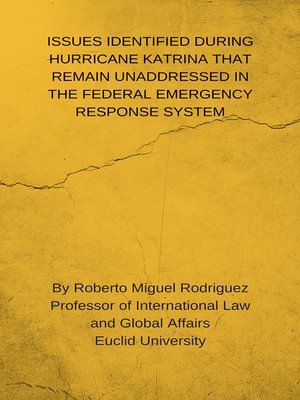Issues Identified During Hurricane Katrina that Remain Unaddressed in the Federal Emergency Response System
ebook
By Roberto Miguel Rodriguez

Sign up to save your library
With an OverDrive account, you can save your favorite libraries for at-a-glance information about availability. Find out more about OverDrive accounts.
Find this title in Libby, the library reading app by OverDrive.



Search for a digital library with this title
Title found at these libraries:
| Library Name | Distance |
|---|---|
| Loading... |
Hurricane Katrina was a natural disaster that hit the southeastern coast of the United States in 2005 and demonstrated how inadequate the nation's response mechanisms were to these catastrophes. It made imperative reforming the federal and other institutions responsible for helping the public in such events and quickly led to new legislation attempting to correct the most glaring deficiencies and weaknesses of our response efforts. This study researched the emergency response areas that remain unaddressed, or which even if addressed, remain deficient. The methodology is a qualitative analysis of the Katrina case study, which uses the large volume of published information about this event to demonstrate that despite all the efforts to-date to improve the quality of our responses to these emergencies, that improvements are still needed in several aspects of the emergency management discipline. Although it is probable that no other future disaster could equal Hurricane Katrina in mismanagement, inefficiency, lack of leadership and blatant negligence on the part of important government officials and their institutions, the public should be aware that important deficiencies remain, such as the inadequate condition and maintenance of most of the nation's infrastructure, intercommunication issues, and little preparation or training in many local jurisdictions.







